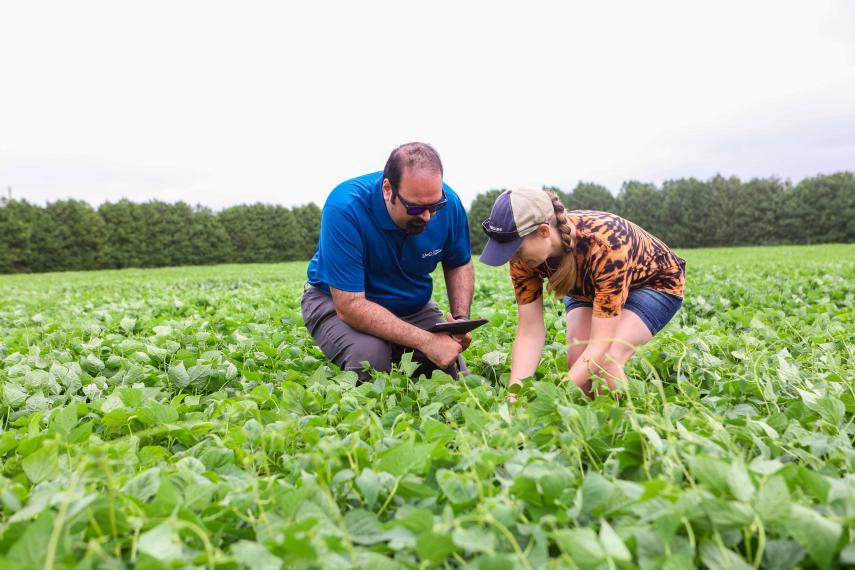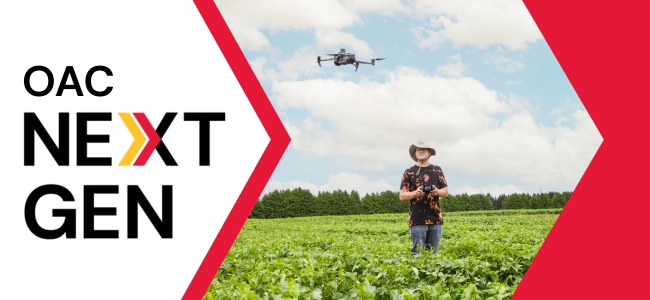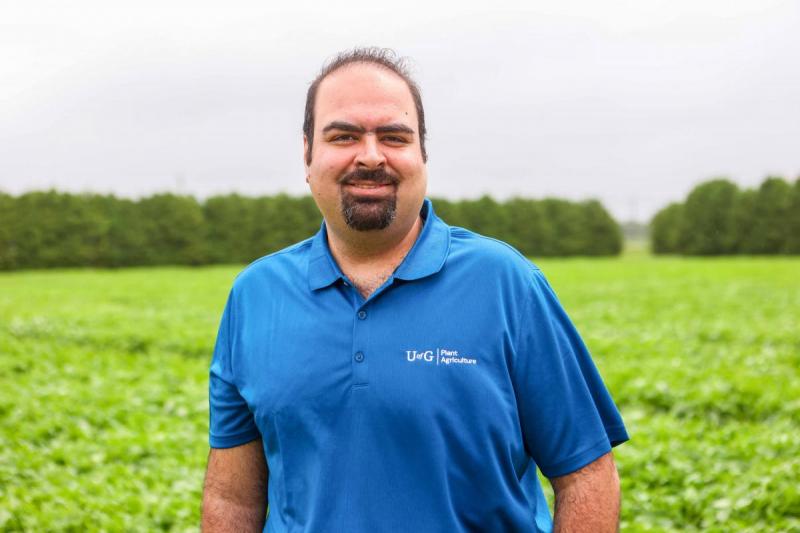Plant Science Prof Launches New AI Platform for Bean Breeding

Agricultural science has entered a data-rich era. From drones capturing field images to genomic sequencing and environmental sensors, plant breeders now have access to more information than ever before. The sheer volume of raw data can be overwhelming for researchers trying to pinpoint which traits will produce the most resilient, high-yielding crops. That’s where artificial intelligence steps in.
OAC’s Dr. Mohsen Yoosefzadeh Najafabadi, who heads the Dry Bean Breeding & Computational Biology Lab, is using AI in a new and innovative approach. His platform, BeanGPT, combines advanced logic and autonomous capabilities with generative AI to help breeders ask more insightful questions, predict outcomes, and find patterns that are difficult to identify without AI assistance.
“Plant breeding has always been about making the best decisions with the information we have. In the past, that relied on the breeder’s eye. Today, we’re combining that experience with AI to make better, faster decisions.” - Dr. Yoosefzadeh Najafabadi
By using advanced AI models, Dr. Yoosefzadeh Najafabadi’s team is helping breeders predict plant performance and even ask questions that guide new experiments. It’s a leap forward in a field that’s been quietly modernizing for years.
Get insights and impact, right in your inbox. Sign up for the OAC NextGen Newsletter
Enter BeanGPT: Your Co-Breeder in the Cloud
BeanGPT is built on over 314,000 scientific articles about beans, including approximately 100 million words of research from around the world. It also includes all available dry bean performance data in Ontario since 2006, covering bean types like navy, black, kidney, cranberry, and pinto. The platform connects directly to major public databases to quickly access information about bean genetics and biology. When a breeder asks it a question, BeanGPT uses eight smart search models to find the best information, then combines it into one clear, helpful answer. This helps breeders and researchers quickly find the most useful insights with greater accuracy than ever before.
“The reason we included information not only from dry beans, but also from soybeans, lima beans, adzuki beans, and other closely related species, is that valuable insights can often be gained by investigating and exploring these neighboring species,” says Yoosefzadeh Najafabadi. “There are areas where certain information hasn’t yet been uncovered in dry beans, but has already been studied in crops like soybeans..”
The platform acts like a co-pilot for plant scientists, allowing users to pose questions about breeding experiments and receive insights based on decades of collective knowledge.
Want to know how a specific genotype will perform in sandy soil under drought conditions? Curious how nutrient density might change under different growing temperatures? Would you like a graph showing the performance of all navy beans in Ontario in different locations, year-to-year? BeanGPT has the answer, based on thousands of peer-reviewed papers, agronomic trials, and datasets.
“It's like having a co-breeder with perfect memory,” says Dr. Yoosefzadeh Najafabadi. “It helps connect traditional knowledge with advanced analytics in ways we couldn’t before.”
Beyond Prediction: A New Model for Quality
In another AI-driven initiative, Dr. Yoosefzadeh Najafabadi’s lab is addressing a longstanding challenge for Ontario: assessing dry bean quality. The province’s bean industry has faced major challenges due to the absence of local research and testing facilities. As a result, bean samples are shipped out of province, with quality testing performed only at advanced breeding stages on a limited number of lines. Some high-yielding beans didn’t always meet quality standards.
With support from partners including Ontario Bean Growers, Agricultural Research and Innovation Ontario (ARIO), Department of Food Science, and Sprague Foods, Dr. Yoosefzadeh Najafabadi is establishing an AI-powered, Ontario-based quality assessment system to evaluate dry bean lines from the earliest breeding stages, focusing on both yield and canning quality. The initiative brings together stakeholders across the bean value chain, farmers, processors, government agencies, breeders, students, and consumers, to help identify and rank dry beans each year. This input, combined with wet lab testing and seed imaging, is being used to develop a first-of-its-kind image-based classification system.
The ultimate goal is to allow breeders to snap a picture of a bean, upload it to BeanGPT, and get an instant, detailed analysis based on years of research and data. This innovative tool will bring important testing back to Ontario, make the process faster and more efficient, and help keep the province’s bean breeding program strong and competitive.
AI: The Future of Feeding the World
Dr. Yoosefzadeh Najafabadi believes the integration of AI in agriculture is more than a trend. It’s essential for the future of our food security.
“With climate change and a growing global population, the pressure is on,” he says. “AI allows us to breed crops that are more resilient, more nutritious, and better adapted to new environments, faster than ever before.”
And while some farmers were initially wary of AI, many are beginning to embrace its power, especially as tools like drones make data collection easier, and platforms like BeanGPT help transform that data into action.
“It’s not about replacing the breeder,” he emphasizes. “It’s about enhancing their ability to make the best decisions. AI can facilitate the integration of tradition with innovation.”
While BeanGPT is designed specifically for dry beans, its underlying technology opens doors for other crops too. The possibilities are vast — from developing climate-resilient varieties to streamlining regulatory approvals or tailoring nutrition for specific populations.
“Innovating in something as essential as food, is the most meaningful work I can imagine,” he says. “Beans might seem simple, but they’re at the centre of sustainability, nutrition, and global agriculture. With AI, we can help them do even more.”
Looking for more insights and expertise like this? Sign up for the OAC NextGen Newsletter

